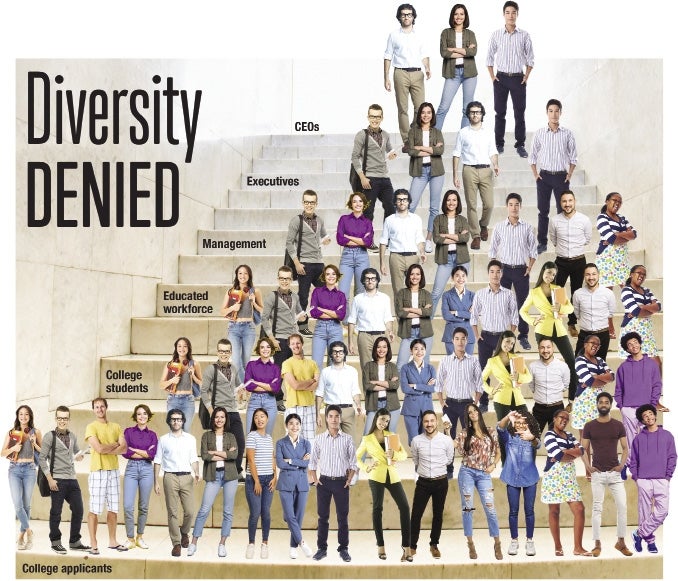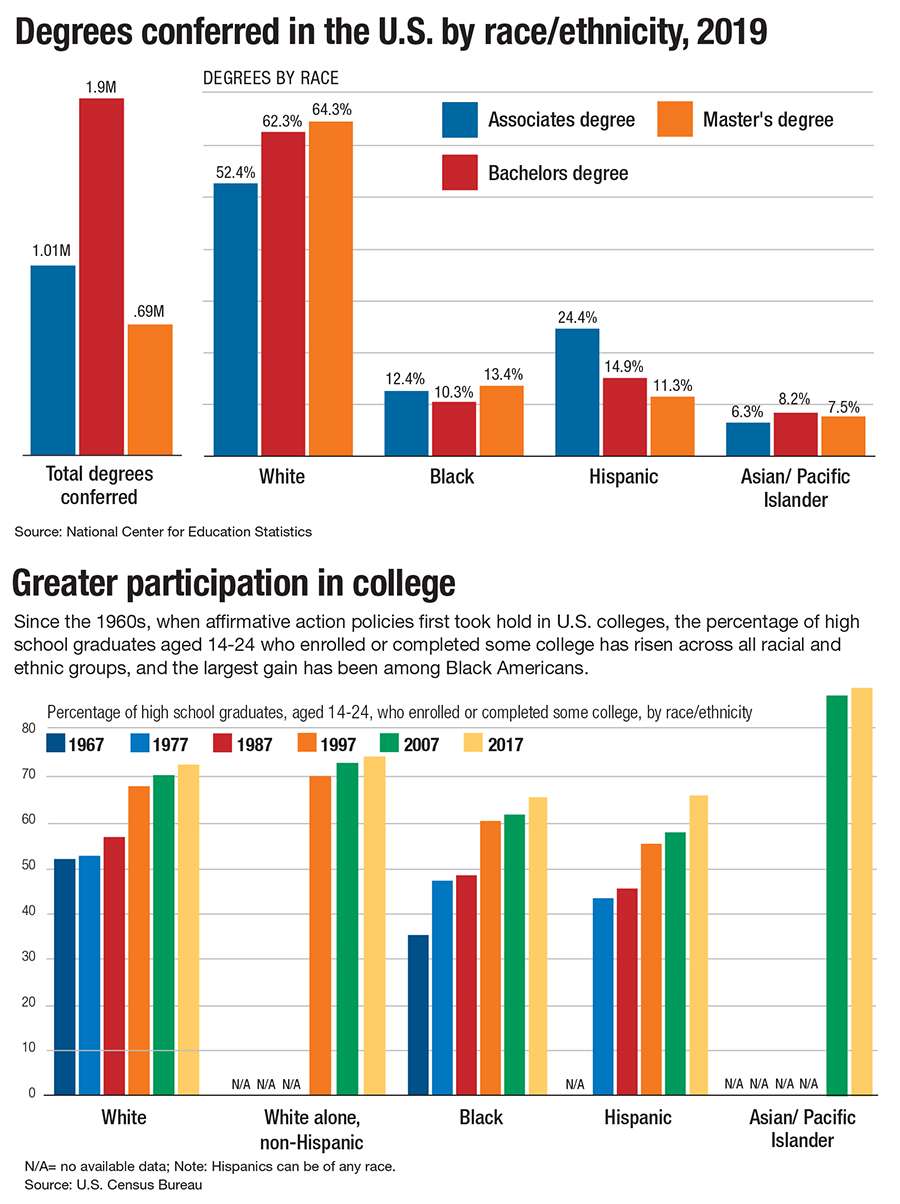
Diversity denied: Affirmative action's removal from college admissions will impact corporate ladder
 PHOTO | Adobe Stock, WBJ Illustration
As the ramifications of the affirmative action decision play out, changes to the corporate ladder are expected.
PHOTO | Adobe Stock, WBJ Illustration
As the ramifications of the affirmative action decision play out, changes to the corporate ladder are expected.
The bottom of the corporate ladder is about to become less diverse.
When the U.S. Supreme Court in June effectively ended affirmative action in higher education admissions, the justices made it harder for Black and brown applicants to get into colleges and universities, particularly elite schools. While the impact will play out over decades, workplace and education officials anticipate the pool of college graduates entering the workforce will become less diverse.
Moreover, they’re worried diversity, equity, and inclusion efforts in the corporate world may fall by the wayside, as goals face increased public headwinds and become more difficult to obtain.
“I am concerned about the level of controversy growing about the idea that it's important for our institutions to reflect the diversity of the population,” said Vincent Rougeau, president of the College of the Holy Cross in Worcester.

If businesses are serious about DEI, they must increase their efforts to help people from disadvantaged backgrounds get into college, and those companies must reevaluate hiring criteria to place value on diverse experiences, said Valerie Zolezzi-Wyndham, founder and CEO of Promoting Good, an Upton DEI consulting firm.
“It’s a long game that should have been happening already,” she said.
The pool of individuals entering the workforce
Since the 1960s, affirmative action has been one of a slew of factors dramatically altering the diversity of college students. Over the past five decades, societal, cultural, and political changes have played out to affect diversity in higher education and beyond. The removal of affirmative action in college admissions is predicted to impact for Black and brown students.

“We need to be realistic about challenges,” Rougeau said. “Many in higher education are expecting to see [student body diversity] drop off.”
The situation has played out on a smaller scale in California and Michigan, as both states banned affirmative action in the 1990s and 2000s, respectively, said Paulette Granberry Russell, president of the National Association of Diversity Officers in Higher Education, a Washington, D.C.-based group.

“What we saw is there is no substitute for race-based admissions,” said Granberry Russell.
Outreach programs that target diverse applicants make a dent but cannot make up for affirmative action, she said.
“Certainly at elite institutions, this decision will have an impact,” she said. “We will see a reduced participation, in some cases significant, of students of color.”
The consequences in higher education may prove to be the canary in a coal mine for both attitudes about diversity and the ability to maintain and promote diversity into the business world.
The change potentially impacts the pool of individuals entering the workforce, Granberry Russell said.
“This will be a setback from a recruitment standpoint because of the pipeline of individuals coming into the corporations,” said Juliette Mayers, founder and CEO of Inspiration Zone, a woman- and minority-owned consulting firm in Boston specializing in diversity and inclusion strategy and branding.
Businesses hiring primarily new college graduates may experience the impact of change in the workforce pipeline first, as that talent pool will be affected first by decisions in higher ed, said Su Joun, principal of Diversity@Workplace Consulting Group, a Cambridge-based corporate trainer and consultant.

“DEI work is hard,” said Joun. “Those organizations who have been hesitant or timid about DEI may use this as a reason to be more timid and stop some programs.”
Keeping DEI going
Businesses’ commitment to DEI needs to extend beyond just hiring, Zolezzi-Wyndham said. Corporations should help colleges foster a diverse applicant pool by supporting and partnering with schools at the high school and elementary level.

“There needs to be a focus on the rigor of education being afforded to students of color so they have the chance to show their excellence,” said Zolezzi-Wyndham.
That’s the pre-college focus businesses should take to aid diversity goals. With a post-college focus, companies should think differently about where they are looking for applicants.
“The leaders today in the corporate space may have to open up their doors to the workforce, which might not be coming from those Ivy institutions,” she said. “Corporations need to think differently about the pedigree that they're requiring. Traditional measures won’t work.”
Businesses should change recruitment policies and the pools where companies have traditionally hired from, Joun said. Historically Black colleges and universities are one place.
“This is an excellent opportunity to revisit and relook at, or look at for the first time: Do you really need a college degree to do the jobs you have openings for?” said Joun.
To counter the end of affirmative action and still keep college student bodies diverse, the College of the Holy Cross plans to use a number of programs in place for years to try to attract more applicants from different backgrounds and geographic areas.
“There will be more work for us to do as institutions to get out into communities so they know that we are eager to have them apply,” Rougeau said.
The college will have to double down on those initiatives and see where it can expand and improve, Rougeau said.
“We will need to be more conscious of the financial need of the students we are asking to apply,” he said.
Colleges will need to put in an effort to rethink how admissions processes work, said Carol Ashley, an attorney with the national law firm Jackson Lewis, who worked on the amicus brief for the American Association for Access, Equity and Diversity.
“It potentially affects everything from when you collect information about race, even if a student volunteers it,” said Ashley. “[The Supreme Court ruling] is reframing college admissions.”
Race was always one careful consideration of a multitude, said Ashley, a limited factor where institutions could establish a record to say they would be unable to teach their diversity goals without its consideration. It will now have to play an even lesser part, and perhaps no part.
“It takes years to recover from the inability to take race into carefully constructed consideration,” Granberry Russell said.
For now, businesses have more leniency than colleges in their approach to diversity goals, said Ashley.
“We have to be cognizant about what we know are the benefits of diversity," said Ashley. “Schools and corporations have to take all steps within the parameters of the court's decision and other legal authorities. There is nothing within the court's decisions that speaks directly to corporations and businesses.”
Whatever approach individual businesses may take, moving forward requires action, and companies cannot use this moment to scale back their diversity, equity, and inclusion efforts, Joun said.
“If organizations take this time to pause their DEI efforts, it's going to be that much harder to restart,” she said. “If you pause, you go backwards.”
WBJ Web Partners
Diversity attained by discriminating is not diversity.
To paraphrase Martin Luther King Jr. - Applicants should be judged by their abilities to do the job, or enter the college, not by the color of their skin.
We should not have DEI goals, but excellence goals.













2 Comments